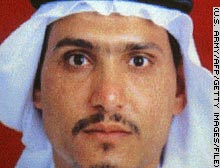|
|
Home | World | U.S. | Weather | Business | Sports | Analysis | Politics | Law | Tech | Science | Health | Entertainment | Offbeat | Travel | Education | Specials | Autos | I-Reports |
|
|
|
Home | World | U.S. | Weather | Business | Sports | Analysis | Politics | Law | Tech | Science | Health | Entertainment | Offbeat | Travel | Education | Specials | Autos | I-Reports |
|

Story Highlights• U.S. commander reports Baghdad security plan yielding results• Iraqi PM speaks with President Bush about security crackdown • Doubts cast on Iraqi government claim al-Masri wounded in firefight • Iraqi Interior Ministry stands by the report, spokesman says Adjust font size:
BAGHDAD, Iraq (CNN) -- The U.S. military on Friday cast doubt on a report from the Iraqi government that al Qaeda in Iraq chief Abu Ayyub al-Masri was wounded in clashes with police. A senior U.S. official, who requested anonymity, told CNN that the U.S. military believes reports about the alleged incident Thursday are false. Despite the doubts, Iraq's Interior Ministry stood by its initial report that police wounded al-Masri -- who is the successor to Abu Musab al-Zarqawi, said ministry spokesman Brig. Gen. Abdul Karim Khalaf. (Watch what al-Masri's death would mean for Iraqi forces Khalaf said Americans would not know about the details because only Iraqi police were involved. This was not a joint U.S.-Iraqi military engagement, Khalaf said. Al-Masri is now on the run, he said. During a news conference Friday, U.S. Maj. Gen. Joseph F. Fil Jr., commander of Multi-National forces in Baghdad, said al-Masri "knows very well that we are definitely after him and that he is a hunted man. I'll leave it at that." He said the loss of al-Masri would have a negative effect on al Qaeda in Iraq, but the insurgent group has the ability to swiftly "rejuvenate leadership." 'They're watching us'Fil said violence in the capital appeared to be decreasing as coalition forces crack down with a new security plan. "They're watching us carefully," Fil said. "There's an air of suspense throughout the city. We believe, there's no question about it, that many of these extremists are lying low and watching to see what it is we do and how we do it. How long that will last, we don't know." The Iraqi reports about al-Masri mark the second time in six months that questions surrounding the insurgent leader's status have surfaced. In October, the U.S. military reported he was dead, but later retracted the statement when it turned out to be false. In addition to al-Masri's alleged injury, Khalaf said al-Masri's top aide, Abu Abdullah al-Majamiai, was killed in the clash. Iraqi police have custody of his body, Khalaf said. The senior U.S. military official told CNN the United States has never heard of al-Majamiai, but added that does not mean he was not associated with al Qaeda in Iraq. Khalaf said al-Masri was wounded during a firefight between Iraqi police and insurgents on a road between Falluja, west of Baghdad, and Samarra, north of Baghdad. The group was trying to enter the town of Balad, Khalaf said. CNN could not independently confirm the report. Al-Masri, also known as Abu Hamza al-Muhajer, is an Egyptian who took over the leadership of al Qaeda in Iraq in June after the death of al-Zarqawi. Iraqi Interior Minister Muwaffak al-Rubaie estimated in October 2006 that al-Masri had been involved in making more than 2,000 car bombs that killed more than 6,000 Iraqis in the past two years. Bush speaks with Iraqi PMIraqi Prime Minister Nuri al-Maliki and U.S. President Bush discussed the new security measures in Iraq during a meeting on closed-circuit TV Friday, according to a statement from the Iraqi leader's office. Al-Maliki reported early successes and repeated that forces will be firm with lawbreakers regardless of religious affiliation, the statement said. Bush renewed his support for al-Maliki, and said the prime minister is filling a leadership role during a sensitive time, according to the prime minister's statement. Specifically, coalition forces are making changes at busy marketplaces that have been vulnerable to attack from car bombers, said Fil. "We're right now in the process of blocking those off, making them pedestrian-only zones," said Fil, who spoke to reporters at the Pentagon via teleconference. "We'll therefore be denying these car bombs the ability to direct themselves as precision weapons where people are the most vulnerable." Fil said the crackdown appears to have reduced violence in recent days. He attributed the decrease to more security forces on the streets and clearing operations. He said 112,000 coalition and Iraqi security forces are devoted to the crackdown. Although there have been some attacks, such as car bombings, in recent weeks, they have not been "well-organized" or "well-aimed," he said. On Friday, about 19 attacks against coalition forces had "zero" effectiveness, he said. U.S., British and Iraqi forces kicked off new security crackdowns Thursday in Basra and Baghdad, a day after the war-torn nation shut down seven crossings along its borders with Iran and Syria. The border shutdown is intended to keep Shiites in Iran and pro-al Qaeda elements in Syria from entering the country, officials said. British and Iraqi troops set up a perimeter around the southeastern port city of Basra, near the Iranian border, in a show of force. The operation "involves the reinforcing and closure of the border crossing points between Iran and Iraq," the British Ministry of Defense said in a statement. Other developmentsCNN's Michael Ware, Jomana Karadsheh, Barbara Starr and Mohammed Tawfeeq contributed to this report. Copyright 2007 CNN. All rights reserved.This material may not be published, broadcast, rewritten, or redistributed. Associated Press contributed to this report.  The Iraqi government stands by a report Abu Ayyub al-Masri was wounded in a firefight. Browse/Search
VIDEO
RELATEDSPECIAL REPORT
• Interactive: Who's who in Iraq
• Interactive: Sectarian divide
• Timeline: Bloodiest days for civilians
|